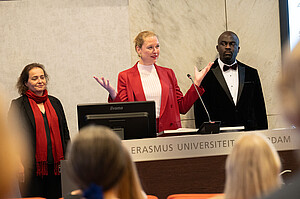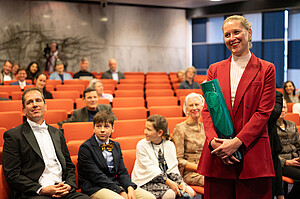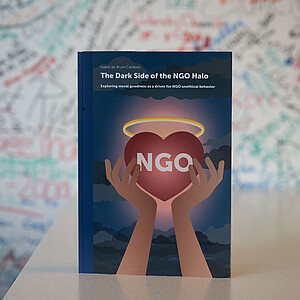PhD Defence Isabel de Bruin Cardoso

Unethical behaviour by non-governmental organizations (NGOs) is often seen as a paradox. NGOs are perceived as morally good despite various examples of unethical behaviour in and by NGOs. In her dissertation, The Dark Side of the NGO Halo: Exploring Moral Goodness as a Driver for NGO Unethical Behaviour, ERIM’s Isabel de Bruin Cardoso drew on social identity theory and cognitive dissonance theory to develop a conceptual framework of the NGO halo effect to explain unethical behaviour through NGO perceived moral goodness. She introduced the concept of the NGO halo effect to explain how people in NGOs can idealise and accordingly prioritise the moral goodness of their organisation’s mission, morals, and people. As a result, NGOs' unethical behaviour is masked by such prioritisation. Results from Isabel's research shed light on how NGO halo can drive unethical behaviour through moral justification, moral superiority, and moral naivety.
Isabel defended her dissertation in the Senate Hall at Erasmus University Rotterdam (EUR) on Thursday, 15 February at 15:30. Her supervisors were prof.dr. Muel Kaptein (EUR) and prof.dr. Lucas Meijs (EUR). Other members of the Doctoral Committee were prof.dr. Tine de Moor (EUR), prof.dr. Marius van Dijke (EUR), prof.dr. Peter Frumkin (University of Pennsylvania), prof.dr. Femida Handy (University of Pennsylvania), and prof.dr. Sara Kinsbergen (Radboud University Nijmegen).
About Isabel de Bruin Cardoso

Isabel de Bruin Cardoso was born in 1983 in Washington D.C., USA. She obtained her Bachelor of Arts in Social Sciences from University College Utrecht in 2004. She obtained a Master of International Affairs from the School of International and Public Affairs at Columbia University in 2007, after which she worked as a staff member and independent consultant for a range of organizations, including large and local NGOs, philanthropic foundations, religious congregations, academia, the UN, World Bank, and national and regional governments on issues relating to ethics, integrity, safeguarding, child protection, and HIV and AIDS, mostly across Africa. After consulting for approximately 15 years, Isabel decided to pursue a PhD with the intention to better be able to understand – and consequently advise on – what drives (un)ethical culture within organizations that have a mission for the public good.
In her PhD, Isabel’s research focused on the unethical behaviour of NGOs, particularly when considering these organizations as morally good. In particular, she researched how we could make sense of this seeming paradox. She focused on moral mechanisms that could be activated internally within purpose-driven organizations that could lead such organizations to motivate, rationalize, or ignore unethical behaviour. Her broader research interests included ethical culture, ethical dilemmas, and nonprofit management.
Alongside her PhD at the part-time PhD program at the Rotterdam School of Management, Isabel continues to consult for a range of NGOs on ethics and integrity. Isabel also lectures on nonprofit management and business ethics. Upon her PhD, Isabel will continue to lecture, conduct research, and consult on the topic of NGO ethics.
Thesis Abstract

There are various examples of unethical behaviour in and by nongovernmental organizations (NGOs), yet NGOs are perceived as morally good organizations. Drawing on social identity theory and cognitive dissonance theory I develop a conceptual framework of the NGO halo effect to show that unethical behavior can be explained because of NGO perceived moral goodness. The NGO halo consists of people in NGOs glorifying the moral goodness of their organization’s mission, morals, and people and accordingly prioritizing them over other considerations, the effect of which can lead to NGO unethical behaviour. Through 34 in-depth semi-structured interviews of people working and volunteering in NGOs, I find that NGO halo can drive unethical behaviour through: (1) prioritizing mission over other organizational considerations, creating an end-justifies-the-means mentality (moral justification); (2) prioritizing the NGO’s morals over legal or social norms, motivating the NGO to trump others’ norms (moral superiority); and (3) prioritizing the NGO’s people over ethics management, leading to unethical behaviour being dismissed (moral naivety). I draw on two studies (combined N=804), to develop multidimensional survey instruments to measure the NGO halo effect, to show that the NGO halo has a positive and significant moderate effect on unethical behaviour. The NGO halo effect is a new factor that can explain the antecedents of NGO unethical behaviour.
View photos of Isabel's PhD Defence
Photos: Michelle Muus / Michelle Muus Fotografie


